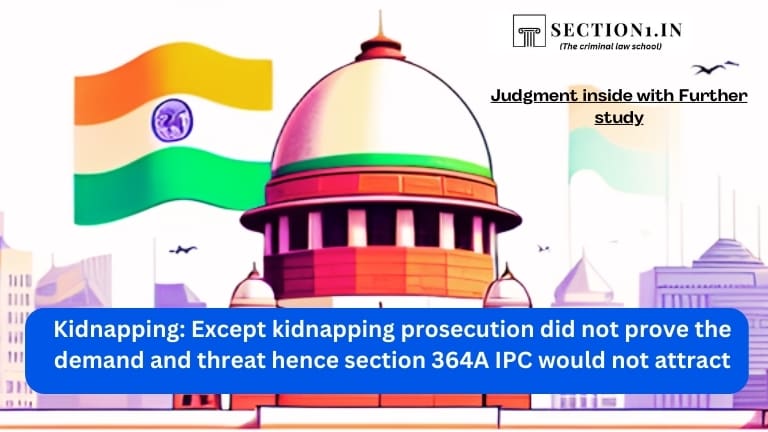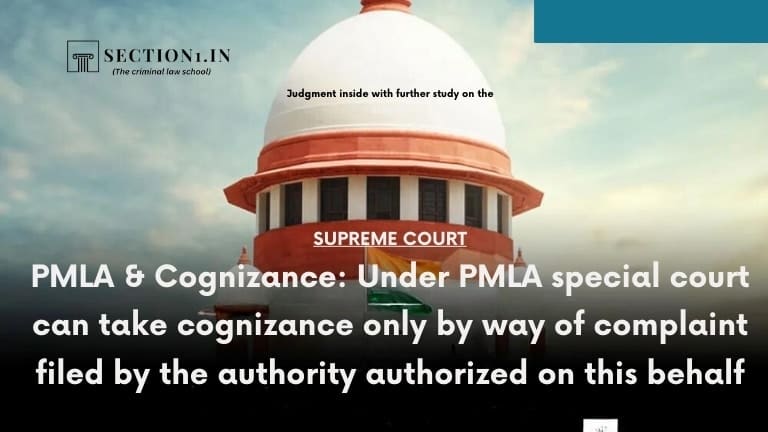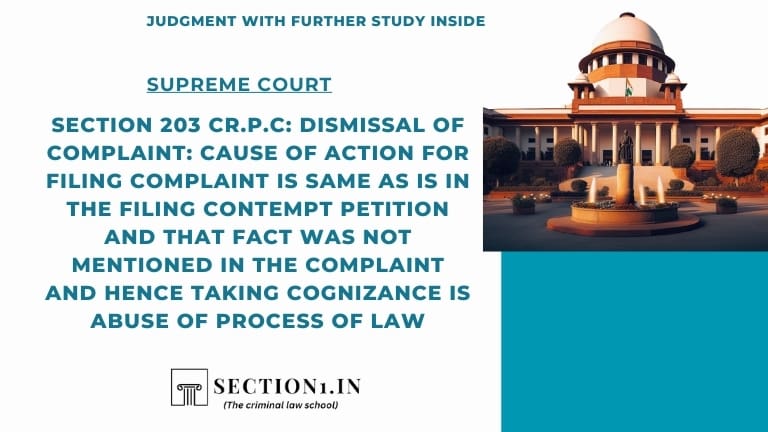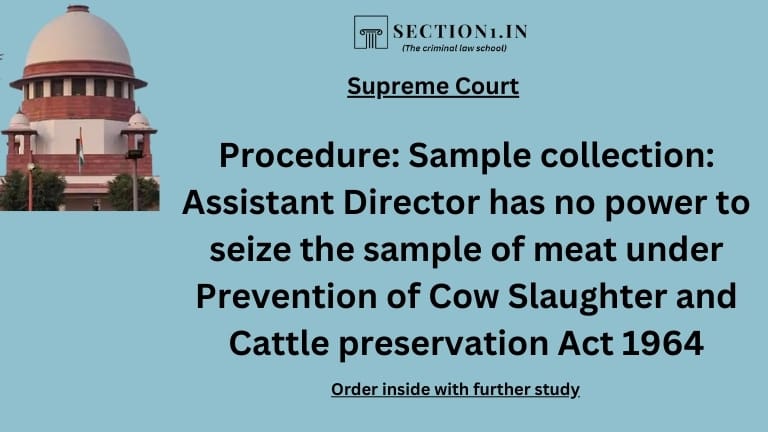Challenge against conviction
1. These two Appeals have been preferred by the accused nos.2 and 1 respectively against the impugned judgment dated 27th July, 2016 passed by the High Court of Judicature at Madras, whereby their conviction and sentence have been confirmed. The appellants-accused have been convicted for the offence punishable under Section 364A read with Section 34 of the Indian Penal Code, 1860 (for short, “IPC”). Both of them have been sentenced to undergo life imprisonment.
Facts
2. With a view to appreciate the controversy, a brief reference to the factual aspects will be necessary. PW-1 and PW-3 are respectively the father and the mother of PW-2 (the child who is the victim of the offence). The age of the child-PW-2 at the relevant time was eight years. The child/PW-2 was taking education in third standard. After returning from the school, the child-PW-2 used to visit the house of PW-5, who was running tuition classes. The child-PW-2 used to return around 07:30 p.m.
P.W-2 (child) was kidnapped by the appellants
3. On 20th October, 2010, the child-PW-2 did not return from the tuition class at usual hour. The case of the prosecution is that after the tuition class was over, while the child-PW-2 was walking back towards his home, a Maruti Car came there. Two persons (appellants-accused) came out and told the child-PW-2 that his father was going to purchase a car from them and, therefore, he should accompany them. Accordingly, the child-PW-2 got into the car and was kidnapped by the appellants-accused.
Ransom threat was received on phone and fir registered u/s 364 A IPC
4. The case of the prosecution is that on 20th October, 2010, from a particular cell phone number, there was a call received by PW-3 of a male person who informed her that he has kidnapped the child. He demanded ransom of Rs.5 lakhs for releasing the child. The PW-1 lodged a complaint on the same date in the night with the Police. PW-14 (who was running a shop in the locality) informed the PW-1 and PW-3 that he saw the child being taken in a Maruti Swift grey colour car. Accordingly, a First Information Report under Section 364A of IPC was registered. PW-19 is the Investigating Officer. As per the information received, PW-19 went to Pallikonda toll gate, Vellore District on 21st October, 2010. Around 12:00 noon, the car in question came towards the toll gate which was intercepted. In the car, the appellants-accused along with the child were found. PW-19 arrested the accused and rescued the child.
5. The prosecution evidence, as can be seen from both the judgments, was in the form of the call records and the evidence of PW-1 to PW-3 and PW-19, the Investigating Officer. As far as the call records are concerned, we find that the entire evidence of the prosecution has been discarded by the High Court for want of a certificate as required under Section 65B of the Indian Evidence Act, 1872 (for short, “the Evidence Act”).
Supreme Court explains section 361 IPC ‘Kidnapping from lawful guardianship’
8. We have carefully considered the submissions. Firstly, we may refer to Section 361 of IPC which defines ‘kidnapping from lawful guardianship’. It provides that whoever takes or entices any minor male child under sixteen years of age, out of the keeping of the lawful guardian of such minor, without the consent of such guardian, is said to kidnap such minor or person from lawful guardianship. In this case, there is no dispute about the lawful guardianship of PW-1 and PW-3. The kidnapping from lawful guardianship is made punishable under Section 363 of IPC and the maximum punishment is imprisonment of either description which may extend to seven years.
Section 364A IPC
9. Now, we turn to Section 364A of IPC which reads thus:
“364A. KIDNAPPING FOR RANSOM, ETC.—Whoever kidnaps or abducts any person or keeps a person in detention after such kidnapping or abduction, and threatens to cause death or hurt to such person, or by his conduct gives rise to a reasonable apprehension that such person may be put to death or hurt, or causes hurt or death to such person in order to compel the Government or any foreign State or international inter-governmental organisation or any other person to do or abstain from doing any act or to pay a ransom, shall be punishable with death, or imprisonment for life, and shall also be liable to fine.”
When section 364A IPC would be attracted explained by Apex court
10. The first ingredient of Section 364A is that there should be a kidnapping or abduction of any person or a person should be kept in detention after such kidnapping or abduction. If the said act is coupled with a threat to cause death or hurt to such person, an offence under Section 364A is attracted. If the first act of CRIMINAL APPEAL NO. 607/2024 4 kidnapping or abduction of a person or keeping him in detention after such kidnapping is coupled with such conduct of the person kidnapping which gives rise to a reasonable apprehension that the kidnapped or abducted person may be put to death or hurt, still Section 364A will be attracted. In the light of this legal position, now we refer to the evidence of the child-PW-2.
Child deposed in his cross-examination that his father taught him the particulars
12. We have carefully perused the cross-examination. On the main incident, his version has not been shaken in the cross-examination. It is true that in response to the questions put to him in the cross-examination by the Advocate appearing for the accused no.2, the child-PW-2 deposed that his father-PW-1 taught him the particulars which need to be reproduced in the Court and that he has recounted the particulars taught by his father before the Court.
Defence theory is that the accused were already known to the parents
13. We find from the cross-examination of the child-PW-2 that there is hardly any challenge to the main incident. In fact, a suggestion was given to him that the men who had taken him in the car are the ones who were acquaintance with him and his father. This is the defence as reflected from the cross-examination.
Accused did not bring on record that there was prior enmity between the parents and the accused
14. It is not brought on record by the accused that there was a prior enmity or animosity between the parents of the victim child and the accused. There was no reason for the father of the victim to falsely implicate the appellants and tutor the child to depose against them. Therefore, the case sought to be made out that the child was tutored by his father was not rightly accepted by the Courts below. Therefore, it can be said that the ‘kidnapping’ within the meaning of Section 361 of IPC was established by the prosecution. Hence, the appellants are guilty of the offence punishable under Section 363 of IPC.
Except kidnapping prosecution did not prove the demand and threat hence section 364A IPC would not attract
15. The learned senior counsel appearing for the appellants were at pains to point out inconsistent versions of PW-1 and PW-3 about who received the phone call demanding ransom. However, this issue need not detain us. The details of the phone call records were produced by the Police. It is an admitted position that the Police could not trace the name of the person who was holding the cell phone number stated by both, the PW-1 and PW-3, in their examination-in-chief. Their version is that they received the call demanding ransom from the said number. The record relating to the call details has been discarded by the High Court as there was no certification under Section 65B of the Evidence Act. The call records could have been the best possible evidence for the prosecution to prove the threats allegedly administered by the accused and the demand of ransom. Even taking the evidence of PW-1 and PW-3 as correct, all that is proved is that they received a phone call from someone for demanding ransom and the person threatened to kill their son in case ransom is not paid. However, the prosecution is not able to connect the alleged demand and the threat with both the accused. Therefore, the ingredients of Section 364A of IPC were not proved by the prosecution inasmuch as the prosecution failed to lead cogent evidence to establish the second part of Section 364A about the threats given by the accused to cause death or hurt to such person. In a given case, if the threats given to the parents or the close relatives of the kidnapped person by the accused are established, then a case can be made out that there was a reasonable apprehension that the person kidnapped may be put to death or hurt may be caused to him. However, in this case, the demand and threat by the accused have not been established by the prosecution.
Party
WILLIAM STEPHEN APPELLANT(S) VERSUS THE STATE OF TAMIL NADU AND ANR. RESPONDENT(S) – CRIMINAL APPEAL NO. 607/2024 – 2024 INSC 146 – FEBRUARY 21, 2024.
https://main.sci.gov.in/supremecourt/2017/27786/27786_2017_7_106_50619_Judgement_21-Feb-2024.pdf
Further study
- SECTION 364 A IPC MODIFIED TO 363 IPC
- Discharge: Expert witness examined by the complainant has stated that the death was natural.
- Basic understanding: A common knowledge in types of crimes and in perspective of Indian criminal laws
- SECTION 24 EVIDENCE ACT – ALL ABOUT EXTRA-JUDICIAL CONFESSION
- SECTION 27 EVIDENCE ACT – MERE RECOVERY OF MONEY ALONE DOES NOT CONSTITUTE CONVICTION.







2 Comments
[…] 10. However, whether the act of causing death was intentional or with knowledge that the injury is sufficient to cause death or whether her act to be considered as a culpable homicide not amounting to murder is to be seen. The learned counsel for the appellant submitted that circumstantial evidence which is pitted against the appellant also without any contradiction indicates that the deceased was a chronic alcoholic andused to pick quarrel with his wife/accused and used to abuse her in filthy language and also tortured her sexually in front of their children. This amounts to a provocation and the sustained provocation principle is to be applied. In support of his submission, the learned appellant counsel would rely upon the judgment of the Hon’ble Supreme Court in Dauvaram Nirmalkar vs. State of Chhattisgarh, wherein the Hon’ble Supreme Court after referring the oft-quoted judgment of the Supreme Court in K.M.Nanavati vs. State of Maharashtra “ The question of loss of self-control by grave and sudden provocation is a question of fact. Act of provocation and loss of selfcontrol, must be actual and reasonable. The law attaches great importance to two things when defence of provocation is taken under Exception 1 to Section 300 of the IPC. […]
[…] Kidnapping: Except kidnapping prosecution did not prove the demand and threat hence section 364A IPC… […]